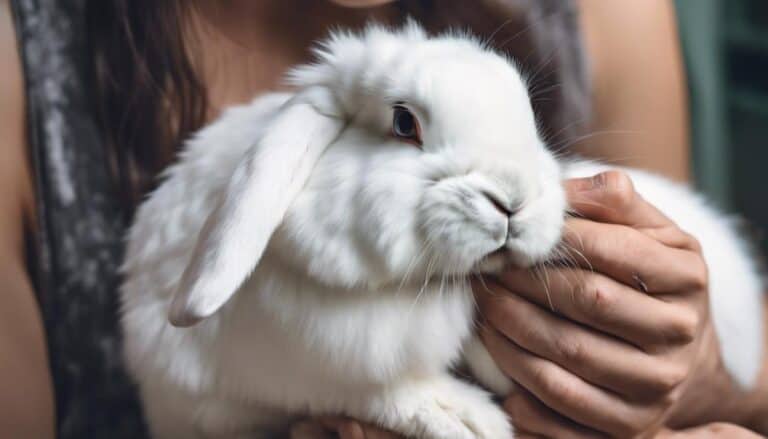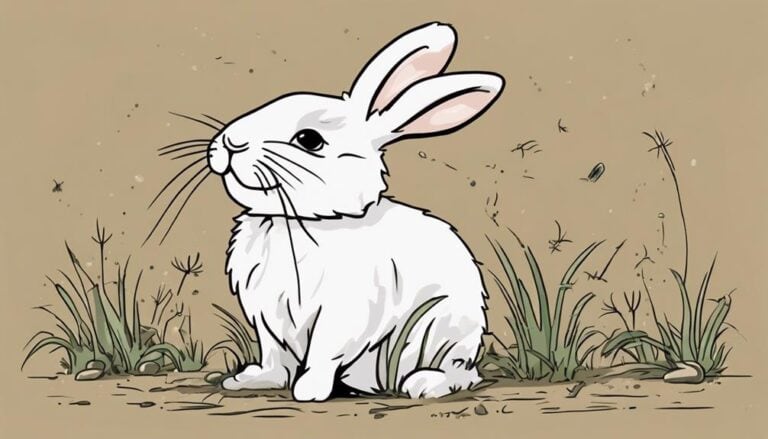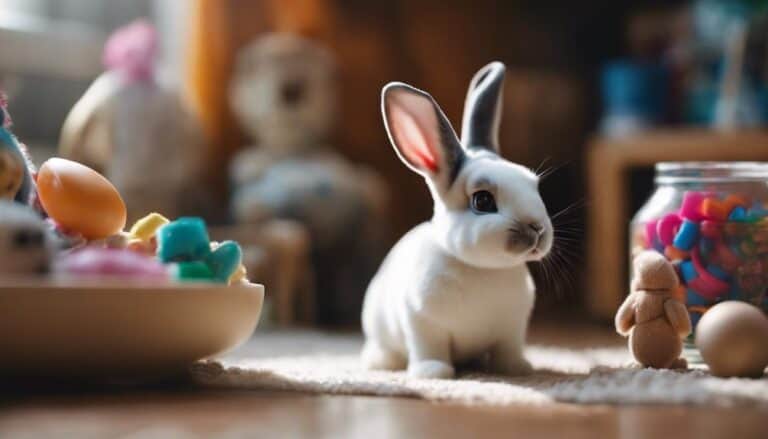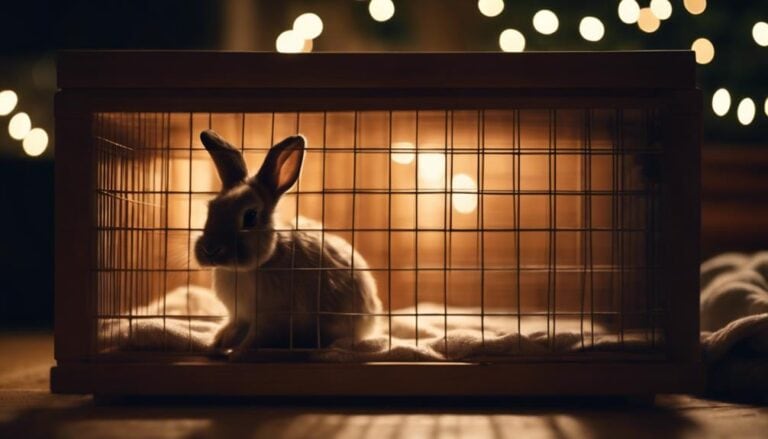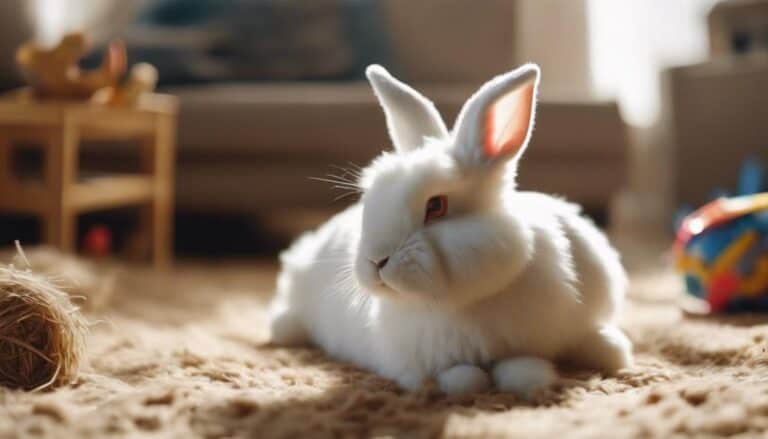Did you know that bunnies are crepuscular animals, meaning they are most active during dawn and dusk?
While you might assume leaving them alone during the day is fine, there are important considerations to keep in mind.
Understanding the impact of solitude on bunnies and how to cater to their social and physical needs is essential for responsible pet ownership.
Explore the nuances of leaving bunnies alone and discover the best practices to guarantee their well-being even in your absence.
Contents
- 1 Key Takeaways
- 2 Factors to Consider Before Leaving Bunnies
- 3 Safety Measures for Bunny's Well-being
- 4 Tips for Leaving Bunnies Alone
- 5 Duration Guidelines for Bunny Care
- 6 Importance of Bunny Companionship
- 7 Ensuring Bunny's Happiness While Absent
- 8 Is It Safe to Leave Bunnies Alone Inside the House?
- 9 Frequently Asked Questions
- 10 Conclusion
Key Takeaways
- Unbonded rabbits should not be left alone for more than a day to prevent health and emotional issues.
- Two bonded rabbits can be left for up to 24 hours, but reliable pet care is crucial.
- Overnight stays are possible in emergencies, but avoid leaving bunnies alone for more than 24 hours.
- Proper care arrangements like a reliable pet sitter or boarding facility are essential for bunny welfare and safety.
Factors to Consider Before Leaving Bunnies
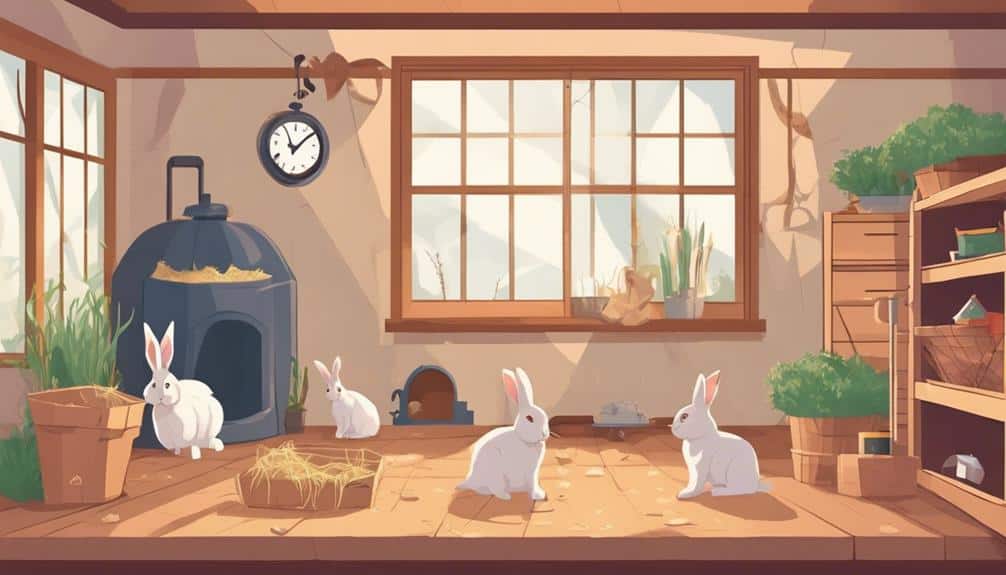
Before leaving bunnies alone, it's important to carefully assess the duration of their time without company and guarantee their welfare needs are adequately met. Bunnies are social animals, and leaving them alone for longer than a regular working day can lead to stress and behavioral issues.
If you must leave your bunnies alone for the weekend or an extended period, reliable pet care arrangements must be made to assure their well-being. Two bonded rabbits can be left alone for up to 24 hours, but ideally not overnight.
Bunnies rely on their owners for companionship, food, exercise, and stimulation, so it's essential to provide regular company, food, water, and a clean environment when they're left alone. Neglecting these needs can lead to health problems and emotional distress for your furry companions.
Prioritizing their care even when you're away is important to maintaining their happiness and health.
Safety Measures for Bunny's Well-being
To maintain your bunny's well-being when left alone, prioritize providing access to essential resources such as clean hay, water, and food. Rabbits require a diet rich in hay to aid digestion and wear down their teeth, so make sure an adequate supply. Water should always be fresh and accessible to prevent dehydration.
Additionally, a balanced diet with rabbit pellets and fresh vegetables is vital for their health. Monitoring your bunny's behavior and health for any signs of distress or illness is important; seek veterinary care promptly if needed.
Provide new toys and entertainment to keep your rabbit mentally stimulated while alone, preventing boredom and potential behavior issues. For longer absences, consider hiring a reputable pet sitter to make sure your bunny receives proper care, social interaction, and attention.
Creating a safe and secure environment, coupled with these measures, will help safeguard your rabbit's well-being when you need to leave them alone.
Tips for Leaving Bunnies Alone
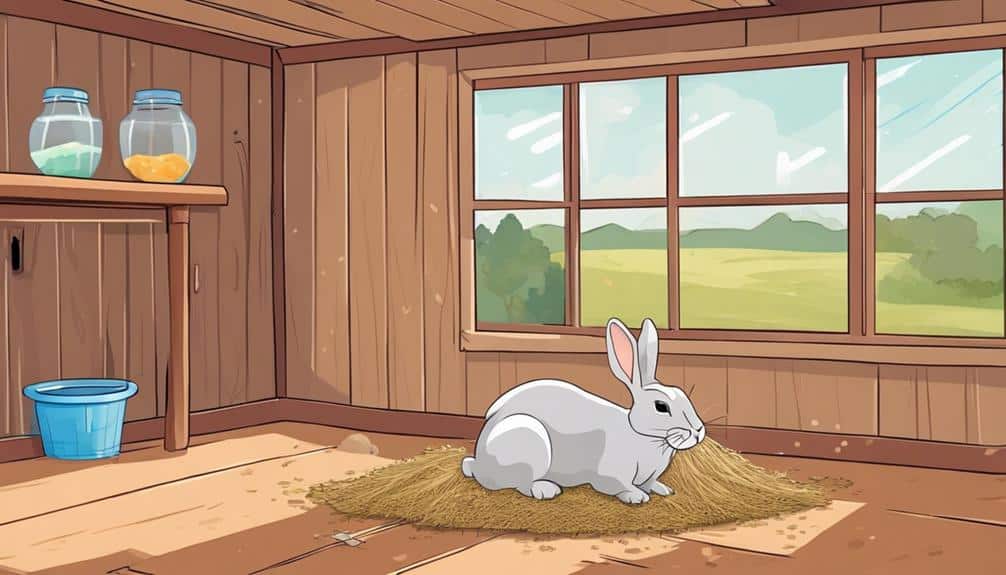
When leaving your bunnies alone, remember to provide hay and water for 6 to 10 hours. Adjust their feeding schedule to include pellets and salad in the evening and fresh dark greens upon your return.
Offering rabbit pellets closer to bedtime is a good practice to verify their well-being while you're away.
Bunny Alone Time
When leaving your bunny alone for an extended period, make sure they have access to hay, water, and fresh food to maintain their well-being. Rabbits can be left alone for 6 to 10 hours during the day, but make certain they have a proper feeding schedule.
Before leaving, provide pellets and salad in the evening, and offer fresh dark greens upon your return for bonding time. To keep your bunny content throughout the night, give them rabbit pellets closer to bedtime.
It's crucial to offer entertainment options and necessary supplies when leaving your rabbit alone for short periods. By attending to your pet's social and dietary needs, you can guarantee they stay happy and healthy during their alone time.
Safe Environment Essentials
Ensuring a safe and secure environment is essential when leaving your bunnies alone.
- Provide ample hay, fresh water, and appropriate food for your bunny.
- Create a comfortable and clean living space for your bunny's well-being.
- Offer suitable toys and enrichment activities to keep your bunny entertained.
- Monitor your bunny's health and behavior closely when leaving them alone.
- Set up a litter box to maintain cleanliness and hygiene for your pet rabbit.
Bunnies are social creatures and need a nurturing environment even when you're not around. By following these essentials, you can leave your bunny alone with peace of mind, knowing they're safe, happy, and well-cared for. Remember, a secure and enriching environment is key to your bunny's well-being during alone time.
Duration Guidelines for Bunny Care
When considering how long you can leave your bunny alone, it's important to follow specific guidelines. An unbonded rabbit shouldn't be left unattended for more than a regular working day, while two bonded rabbits can manage up to 24 hours alone.
Emergency situations may allow for overnight stays, but it's not ideal to leave a rabbit alone for more than 24 hours.
Alone Time for Bunnies
For proper bunny care, it's important to establish clear guidelines on the duration bunnies can be left alone. Here are some key considerations to guarantee the well-being of your furry friend:
- An unbonded rabbit shouldn't be left alone for more than a regular working day to prevent stress and loneliness.
- Two bonded rabbits can be left alone for up to 24 hours with proper provisions for food, water, and safety.
- Leaving a rabbit alone overnight is possible in emergencies, but it isn't ideal for their well-being.
- It isn't recommended to leave a rabbit alone for more than 24 hours due to their social nature and need for interaction.
- Reliable pet care arrangements are essential for absences longer than a few days to guarantee the well-being of the bunny.
Bunny Care Schedule
To maintain a healthy and happy bunny, it's important to adhere to specific duration guidelines for their care, especially when it comes to leaving them alone. An unbonded rabbit shouldn't be left alone for more than a regular working day to prevent stress and health problems.
However, two bonded rabbits can stay together for up to 24 hours with less risk. Although leaving a rabbit alone overnight may be feasible in emergencies, it isn't vital for their well-being.
It's critical to make reliable pet care arrangements if you need to be away for more extended periods, as rabbits require consistent attention and care to thrive. By following these duration guidelines, you can help guarantee the health and happiness of your pet rabbits.
Importance of Bunny Companionship
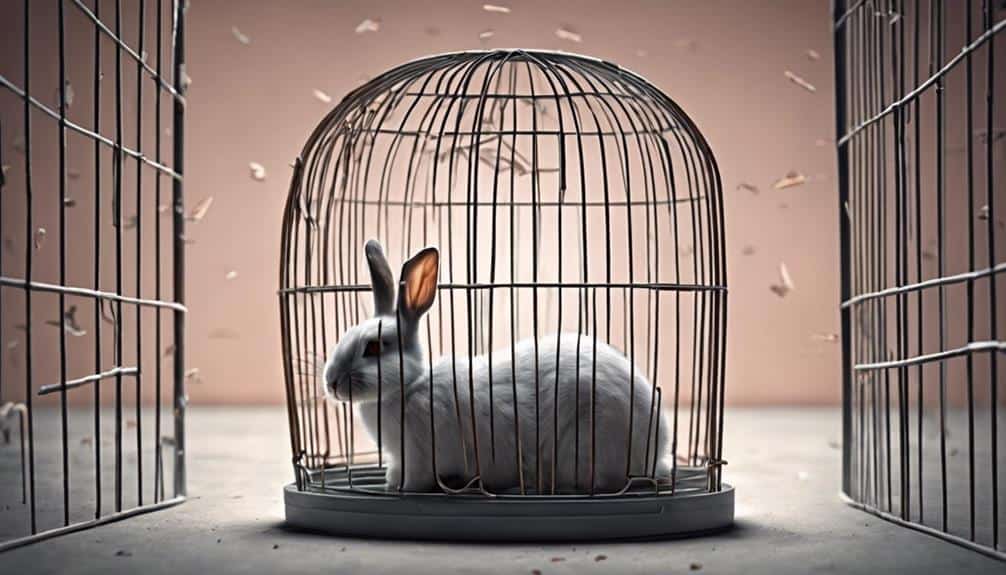
Domestic rabbits greatly benefit from companionship for their social interaction and overall well-being. Here are some key points highlighting the importance of bunny companionship:
- All Ages Benefit: Rabbits of all ages benefit from having a rabbit companion.
- Gender Irrelevant: Gender doesn't determine the need for companionship in rabbits.
- Preventing Loneliness: Companionship is essential to prevent loneliness and behavioral issues in rabbits.
- Happier Together: Most domestic bunnies thrive and are happier when paired with another rabbit.
- Enhanced Well-being: Companionship enhances the overall well-being of rabbits by fulfilling their social needs.
Providing bunny companionship isn't just about having another rabbit around; it plays a critical role in ensuring your furry friend's mental and emotional health. By understanding and meeting your rabbit's social needs through companionship, you contribute significantly to their happiness and quality of life.
Ensuring Bunny's Happiness While Absent
When guaranteeing your bunny's happiness while you're absent, providing companionship or arranging for a pet sitter can be crucial. Rabbits are social animals that thrive on interaction and companionship. To look after your bunny's needs, consider having someone check in on them regularly to provide social interaction, guarantee their well-being, and attend to any needs that may arise. Additionally, leaving entertainment such as music or toys can help stimulate your bunny's senses and prevent boredom. Upgrading equipment like hay feeders and litter boxes can also contribute to your bunny's well-being during your absence.
Ensuring that essential supplies are stocked and proper care arrangements are in place before you leave can help maintain your bunny's happiness while alone. Prioritize communication, interaction, and mental stimulation to keep your bunny content and happy in your absence. By taking these steps, you can guarantee that your bunny remains well taken care of and content even when you aren't there.
Is It Safe to Leave Bunnies Alone Inside the House?
Yes, keeping bunnies indoors can be safe as long as you bunny-proof your home. Make sure to remove any hazardous items and provide a secure, spacious area for them to play. Also, consider their social needs and provide plenty of mental stimulation to keep them happy and healthy.
Frequently Asked Questions
How Long Can You Leave a Bunny Alone For?
You should not leave a bunny alone for more than a regular workday. Two bonded bunnies can stay together for up to 24 hours. For longer absences, reliable pet care is crucial to make certain their well-being and safety.
What to Do With Your Bunny When You Go on Vacation?
When you go on vacation, consider bunny boarding options, pet sitter recommendations, or traveling with your rabbit. Bunny proof your home, provide a safe space, and address separation anxiety to guarantee your bunny's well-being.
Is It Okay to Keep a Single Rabbit?
It's crucial to contemplate a rabbit's social needs. They need companionship for bonding, avoiding behavioral issues, and maintaining emotional well-being. Single rabbits may suffer health implications. Pairing rabbits guarantees they thrive together.
Do Rabbits Get Used to Being Alone?
When left alone, rabbits might struggle with social interaction, leading to potential behavioral changes and impacts on their mental health. Spending bonding time, providing enrichment activities, and a consistent routine can help them cope better.
Conclusion
As you prepare to leave your bunnies alone, remember the importance of their well-being and happiness. Follow the safety measures and tips provided to guarantee they're cared for in your absence.
But what happens when unexpected challenges arise? Stay tuned for our next article, where we explore how to handle unforeseen situations when leaving your bunnies alone.
Stay informed and prepared for any scenario that may come your way.

